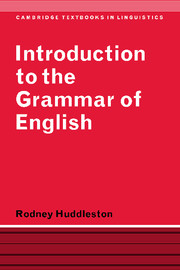Book contents
- Frontmatter
- Contents
- Preface
- Table of symbols and notational conventions
- 1 Basic concepts in grammar
- 2 The structural approach to linguistic analysis
- 3 The parts of speech
- 4 Verbs and verb phrases
- 5 The structure of kernel clauses
- 6 Nouns and noun phrases
- 7 Pronouns
- 8 Adjectives and adjective phrases
- 9 Verbs, nouns and adjectives: the boundaries between them
- 10 Adverbs, prepositions and conjunctions
- 11 Clause type
- 12 Coordination and subordination
- 13 Negation
- 14 Thematic systems of the clause
- References
- Index
4 - Verbs and verb phrases
Published online by Cambridge University Press: 05 June 2012
- Frontmatter
- Contents
- Preface
- Table of symbols and notational conventions
- 1 Basic concepts in grammar
- 2 The structural approach to linguistic analysis
- 3 The parts of speech
- 4 Verbs and verb phrases
- 5 The structure of kernel clauses
- 6 Nouns and noun phrases
- 7 Pronouns
- 8 Adjectives and adjective phrases
- 9 Verbs, nouns and adjectives: the boundaries between them
- 10 Adverbs, prepositions and conjunctions
- 11 Clause type
- 12 Coordination and subordination
- 13 Negation
- 14 Thematic systems of the clause
- References
- Index
Summary
Verbs
The most central members of the word-class verb have the following two properties:
(a) Inflection. They are tensed: they have one or other of the inflectional properties ‘past tense’ and ‘present tense’. Thus in He lived in Sydney and He lives in Sydney the words lived and lives are prototypical verbs. In the present tense the verb – again prototypically – agrees with the subject as 3rd person singular vs general (i.e. not 3rd person singular): He lives in Sydney vs I/you/we I they live in Sydney.
(b) Functional potential. They function as the ultimate head of the clause (with the EVP and VP as intervening categories), as explained in the last chapter.
It is tensed verbs that are most sharply distinct from words belonging to other parts of speech: this is why non-tensed verbs may be regarded as less central members of the class. As we have seen, the non-tensed forms (more specifically the non-finite forms of the traditional paradigm) are traditionally spoken of as verbal nouns or verbal adjectives, and although we are rejecting that kind of description there is no doubt that they have closer affinities with nouns and adjectives than do tensed verbs. We thus take tensed forms as the prototype and include other words within the class on the basis of their functional resemblance to the prototype. The status of a non-tensed word as a verb is then clearest when it is functioning as ultimate head of a tensed clause as in He was writing the let.
- Type
- Chapter
- Information
- Introduction to the Grammar of English , pp. 124 - 176Publisher: Cambridge University PressPrint publication year: 1984

